-
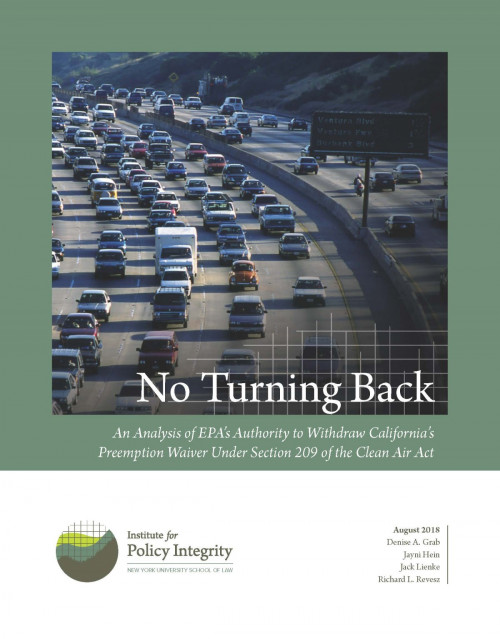
No Turning Back
An Analysis of EPA’s Authority to Withdraw California’s Preemption Waiver Under Section 209 of the Clean Air Act
For 50 years, California has enjoyed unique authority to regulate air pollution from newly manufactured motor vehicles. While the Clean Air Act preempts all other states from setting their own vehicle emission standards, California can request a waiver to do so if it determines that its standards are at least as protective of public health and welfare as federal standards issued by the U.S. Environmental Protection Agency (“EPA”). Once a waiver is granted, other states can adopt California’s more stringent vehicle emissions standards as their own. EPA has now proposed to withdraw the waiver California received in 2013 to set its own greenhouse gas emission standards. Because a waiver withdrawal would be entirely unprecedented, neither courts nor legal scholars have previously had cause to discuss the circumstances, if any, under which a waiver might permissibly be withdrawn. This report analyzes whether EPA possesses revocation authority and, assuming it exists at all, when and how such authority may be exercised. It is an update to the August 2018 version of the same report.
-
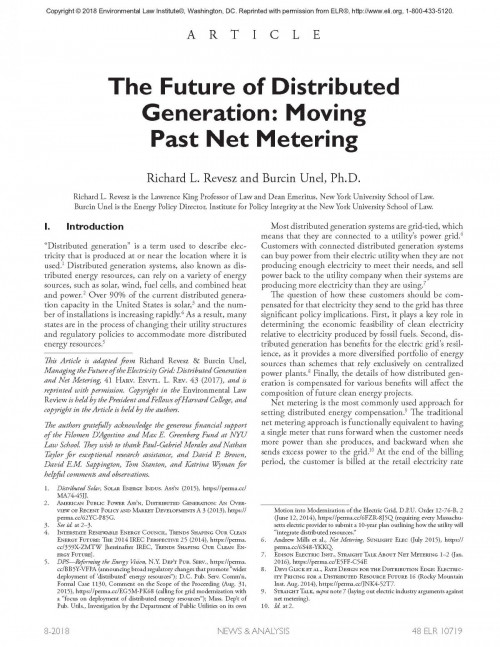
The Future of Distributed Generation
Moving Past Net Metering
This article provides an overview of the benefits and the costs of distributed generation and highlights the analytical flaws and missing elements in the competing positions and in most existing policies. We propose an alternative approach that recognizes the contributions to the electric grid of both utilities and distributed generators. The article is excerpted and revised from a longer academic article, “Managing the Future of the Electricity Grid: Distributed Generation and Net Metering,” which was selected by Environmental Law Reporter as one of the five best environmental law articles published in the 2017-2018 academic year.
-
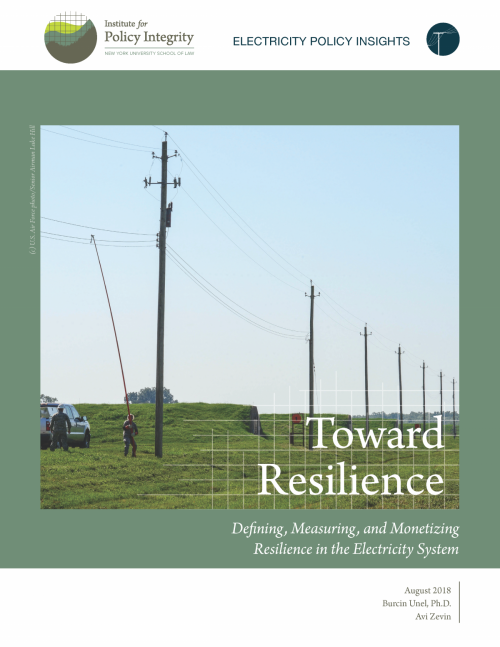
Toward Resilience
Defining, Measuring, and Monetizing Resilience in the Electricity System
Grid resilience—generally, the electric grid’s ability to resist/absorb, manage, quickly respond, and recover from/adapt to high-impact, low-probability external shocks—has been a concern for electric utilities and energy planners for decades. While recent extreme weather and cyber security concerns have prompted the federal government to pursue policies that support coal and nuclear power plants, a more systematic focus on resilience will lead to very different solutions than what has been proposed by the Department of Energy. Our report aims to assist policymakers in understanding grid resilience and evaluating potential interventions aimed at improving grid resilience.
-

How States Can Value Pollution Reductions from Distributed Energy Resources
DERs are a growing part of the U.S. electric system and many state electric utility regulators are looking to more accurately compensate them by paying for a variety of the benefits that these resources provide. Most states are currently focusing on energy and distribution-level benefits, but this approach overlooks the environmental and public health impacts of DERs. Even though some states like California and New York have been working on analyses that include environmental attributes of DERs, few regulators have attempted a thorough evaluation of the environmental and public health benefits. Our report, Valuing Pollution Reduction, lays out a practical methodology for calculating the E value, the highlights of which are captured here. Specifically, this issue brief describes how to appropriately value environmental and public health benefits by monetizing the economic, health, and climate damages avoided emissions would have caused. State utility regulators can use the steps described here, weighing tradeoffs between accuracy and administrability, to implement their own program to holistically compensate DERs.
-
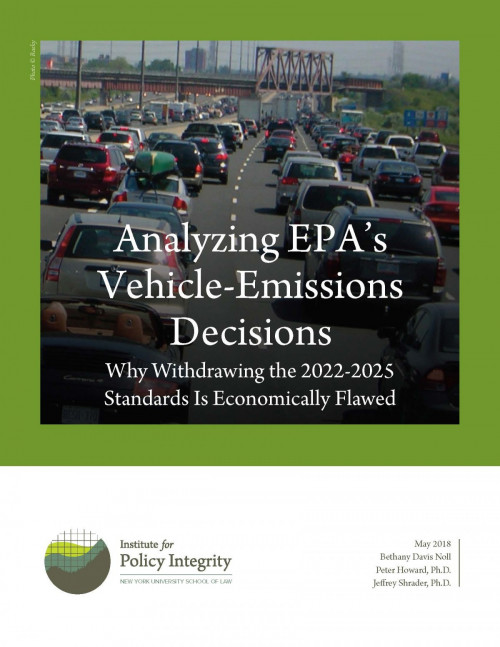
Analyzing EPA’s Vehicle-Emissions Decisions
Why Withdrawing the 2022-2025 Standards Is Economically Flawed
The Environmental Protection Agency sets greenhouse gas emissions standards for cars and light trucks, and it periodically reevaluates these standards to make sure that car manufacturers can comply. In April 2018, EPA withdrew its previous determination that standards for model year 2022–2025 vehicles were appropriate and would improve public welfare, now saying that more recent information suggests that the standards are too stringent. Our policy brief shows that EPA’s claim—that new information indicates that the assumptions underlying the previous determination are unrealistic—is not supported by the evidence. In fact, the opposite is the case. Recent trends in fuel prices, vehicle sales, automaker compliance, and safety all indicate that the existing 2022–2025 standards can be met at low cost while delivering large benefits to consumers and the economy. EPA’s decision to withdraw the standards will instead cause regulatory uncertainty that will hurt the automotive sector while also harming the environment.
-
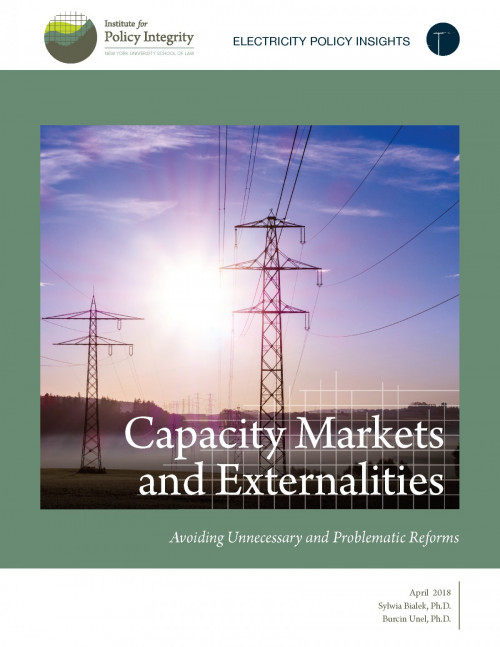
Capacity Markets and Externalities
Avoiding Unnecessary and Problematic Reforms
Many states are taking action on climate change by paying zero- and low-emitting electricity generators for avoiding the emissions that fossil-fuel-fired resources would otherwise emit. These “externality payments” help level the playing field between emitting and non-emitting generators. Critics of these policies argue that these payments might negatively affect the efficiency of wholesale electricity markets by reducing capacity prices, which heavily affect how generators enter and exit the market. Our report shows why the premises underlying recent reforms, which seek to shield capacity markets from the potential price impact of pollution externality payments, are flawed.
-
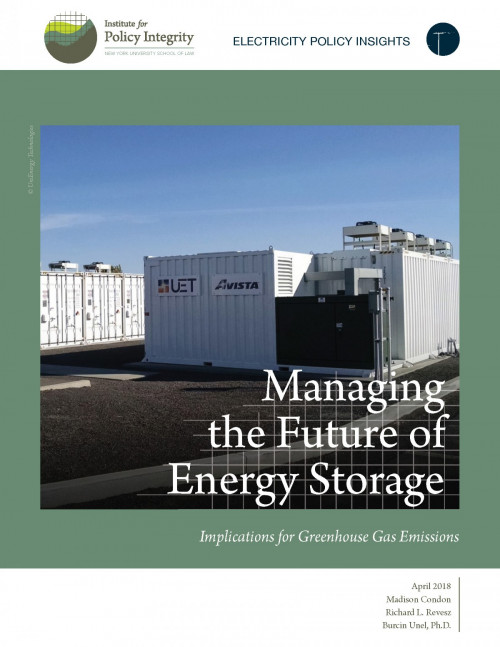
Managing the Future of Energy Storage
Implications for Greenhouse Gas Emissions
Many policymakers assume that increasing deployment of energy storage will automatically reduce greenhouse gas emissions, in part by helping to integrate renewable energy resources with intermittent and variable generation. This report, published in the Harvard Environmental Law Review, explores situations in which energy storage systems can in fact lead to increased emissions, and offers reforms to correct for poor incentives while ensuring that energy storage can provide the maximum benefit possible to the grid.
-
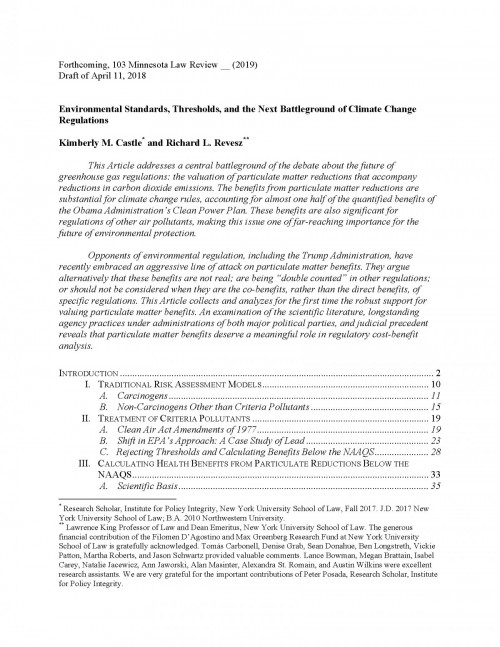
Environmental Standards, Thresholds, and the Next Battleground of Climate Change Regulations
Regulations to curtail climate change have the additional benefit of reducing air pollution by accelerating the shift away from carbon-intensive and high-polluting energy such as coal. The benefits from reducing just one air pollutant – particulate matter – account for almost half of the quantified benefits of the Obama Administration’s Clean Power Plan. Regulatory opponents have launched an aggressive attack on the use of these benefits to justify climate change regulations. They claim that these benefits are not real, are accounted for in other regulations, or should not be considered because they are indirect benefits. This article, published in the Minnesota Law Review, collects and analyzes for the first time the robust support for valuing particulate matter and other air pollution reduction benefits. Following an examination of the scientific literature, longstanding agency practices under administrations of both major political parties, and judicial precedent, the authors conclude that particulate matter benefits deserve a meaningful role in regulatory cost-benefit analysis.
-
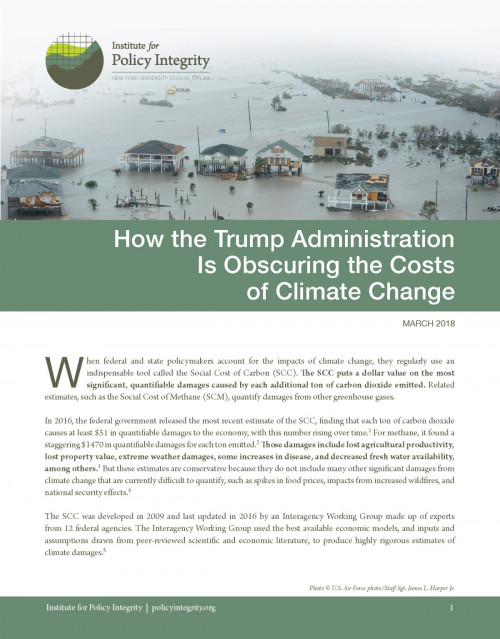
How the Trump Administration Is Obscuring the Costs of Climate Change
When federal and state policymakers account for the impacts of climate change, they regularly use a tool called the Social Cost of Carbon (SCC). The SCC puts a dollar value on the most significant, quantifiable damages caused by each additional ton of carbon dioxide emitted. The most recent estimate of the cost is at least $51 per ton and rising over time. But now, turning its back on years of work, the Trump administration has disbanded the federal group that developed the SCC, and produced a new “interim” estimate claiming that each ton of carbon dioxide causes as little as $1 in climate damages. This issue brief describes how the Trump Administration reached this misleading number by ignoring the interconnected, global nature of our climate-vulnerable economy and obscuring the devastating effects that climate change will have on younger and future generations. Though the administration has been proposing rollbacks of environmental rules using this problematic SCC estimate as justification, we explain why federal agencies and state governments should continue using the most recent estimate by the Interagency Working Group that developed the SCC.
-
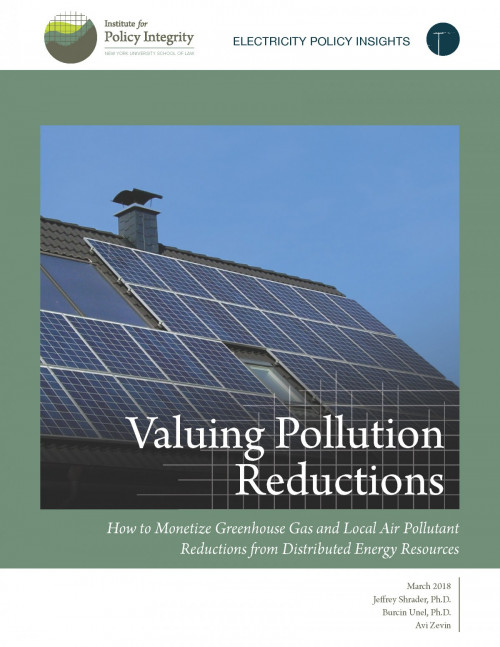
Valuing Pollution Reductions
How to Monetize Greenhouse Gas and Local Air Pollutant Reductions from Distributed Energy Resources
Distributed energy resources (DERs)—grid-connected, small-scale electric generators such as rooftop solar installations, micro-turbines, combined heat and power systems, customer backup generators, and distributed energy storage systems—are a growing part of the U.S. electric system. They can help avoid the high levels of greenhouse gases and local air pollution produced by traditional energy sources. As their use grows, state electric utility regulators are seeking to compensate DERs accurately for the benefits they offer, including reductions in pollution that contributes to climate change and harms human health. This report shows how regulators can calculate the types and amount of pollution avoided, and then monetize these benefits for use in policy.
Viewing recent projects in Publications
